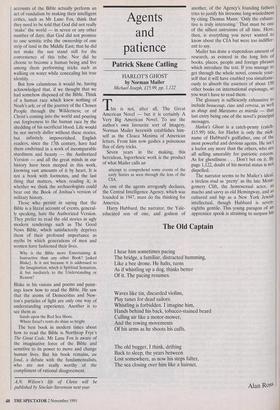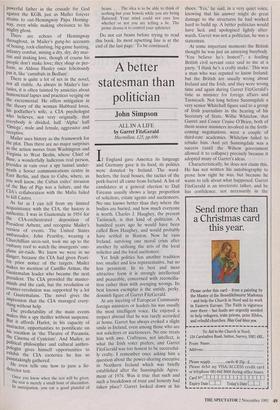Agents and patience
Patrick Skene Catling
HARLOT'S GHOST by Norman Mailer Michael Joseph, £15.99, pp. 1,122 This is not, after all, The Great American Novel — but it is certainly A Very Big American Novel. To use the author's own favourite sort of imagery, Norman Mailer herewith establishes him- self as the Cloaca Maxima of American letters. From him now gushes a poisonous flux of dirty tricks.
Seven years in the making, this herculean, logorrhoeic work is the product of what Mailer calls an
attempt to comprehend some events of the early Sixties as seen through the lens of the CIA.
As one of the agents arrogantly declares, the Central Intelligence Agency, which was founded in 1947, must do the thinking for America.
Harry Hubbard, the narrator, the Yale- educated son of one, and godson of another, of the Agency's founding fathers tries to justify his tiresome long-windedness by citing Thomas Mann: 'Only the exhaus- tive is truly interesting.' That must be one of the silliest untruisms of all time. Here, then, is everything you never wanted to know about the CIA but were too indiffer- ent to say.
Mailer has done a stupendous amount of research, as evinced in the long lists of books, places, people and foreign phrases which introduce the text. If you manage to get through the whole novel, console your- self that it will have enabled you simultane- ously to absorb the essences of about 150 other books on international espionage, so you won't have to read them.
The glossary is sufficiently exhaustive to include beaucoup, ciao and cervesa, as well as shtup and Marxism° es mierda — that last entry being one of the novel's principal messages.
Harlot's Ghost is a catch-penny (catch- £15.99) title, for Harlot is only the nick- name of Hubbard's godfather, one of the most powerful and devious agents. He isn't a harlot any more than the others, who are all selling amorality for patriotic esteem. As for ghostliness . . Don't bet on it. By page 1,122, doubt of his mortal status is nOt dispelled.
The narrator seems to be Mailer's ideal, a tireless stud as 'pretty' as the late Mont- gomery Clift, the homosexual actor, as macho and savvy as old Hemingway, and as cultured and hip as a New York Jewish intellectual, though Hubbard is seven
-
eighths gentile. This young paragon of an apprentice spook is straining to surpass his Powerful father in the crusade for God against the KGB, just as Mailer forever strains to out-Hemingway Papa Heming- way, even while making obeisance to his mighty ghost.
There are echoes of Hemingway throughout, in Mailer's gung-ho accounts Of boxing, rock-climbing, big-game hunting, infantry combat, mixing a dry, dry, dry mar- tini and making love, though of course his People don't make love; they shtup or per- form, as Aldous Huxley once felicitously put it, like 'cannibals in Bedlam'.
There is quite a lot of sex in the novel, not all risible. As always in Mailer's fan- tasies, it is often tainted by anxieties about homosexual lapses and practices verging on the excremental. He offers mitigation in the theory of the woman Hubbard loves, his godfather's wife, a CIA psychologist Who believes, not very originally, that everybody is divided, half 'Alpha' half 'Omega', male and female, aggressive and receptive.
Mailer uses history as the framework for the plot. Thus there are no major surprises as the action moves from Washington and Virginia to West Berlin, whose Chief of Base, a wonderfully ludicrous real person, Presides in vain over a spy tunnel under- neath a Soviet communications centre in East Berlin, and then to Cuba, where, as You well know, the Cuban exiles' invasion cif the Bay of Pigs was a failure, and the CIA's collaboration with the Mafia failed to kill Castro.
As far as I can tell from my limited acquaintance with the CIA, the history is authentic. I was in Guatemala in 1954 for the CIA-orchestrated deposition of President Arbenz, and recognise Mailer's version of events. The United States ambassador, John Peurifoy, wearing a Churchillian siren-suit, took me up to the embassy roof to watch the insurgents' one- Plane air-raids. We knew we were in no danger, because the CIA had given Peuri- toy prior notice of the targets. Mailer makes no mention of Castillo Armas, the Guatemalan leader who became the next President. The CIA provided the master- minds and the cash, but the revolution or Counter-revolution was supported by a lot !A Guatemalans. The novel gives the linpression that the CIA managed every- thing without help. The predictability of the main events makes this a spy thriller without suspense. But it affords Harlot, in his capacity of in.structor, opportunities to pontificate on hiS vocation in the Theatre of Paranoia, the Cinema of Cynicism'. And Mailer, as Political philosopher and cultural anthro- Pologist gives himself opportunities to exhibit the CIA esoterica he has so Painstakingly gathered.
He even tells one how to pass a lie- detector test.
Once you know when the test will be given, the rest is merely a small bout of discomfort. In anticipation, you eat a good plateful of
beans. . . . The idea is to be able to think of nothing but your bowels while you are being fluttered. Your mind could not care less whether or not you are telling a lie. The prime drama is to control your sphincter.
Do not eat beans before trying to read this book. Its most upsetting line is at the end of the last page: 'To be continued.'



































































 Previous page
Previous page